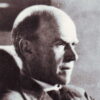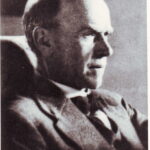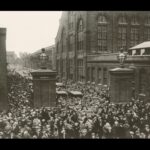George Elton Mayo was born in Adelaide, South Australia, on 26th December 1880, the son of engineer George Gibbes Mayo and his wife Henrietta Mary (née Donaldson). His career should be an inspiration to all who struggled at school or who were slow starters in life. Educated at Queen’s School and St. Peter’s College, he failed his second year of medical school not once but three times, in Adelaide, Edinburgh and London. He tried working with a gold mining company in what is now Ghana but was invalided out and worked in London for a time in journalism and adult education.
Returning to Adelaide he studied philosophy and psychology under William Mitchell at the University of Adelaide, graduating in 1911 with an Honours B.A. He then became the founding Lecturer in Logic, Psychology and Ethics at the new University of Queensland. On 18th April 1913 he married Dorothea McConnel. He was a successful, though extremely demanding, teacher and was rewarded with promotion to the Professorship of Philosophy in 1919. Elton Mayo’s vision combined philosophy, psychology and economics. He rapidly absorbed the new ideas of psychoanalysis and advocated an industrial society in which capitalism was controlled and social stability, unity and health fostered. He lectured for the Workers’ Educational Association and after the First World War pioneered the use of psychoanalysis and other new techniques in the rehabilitation of soldiers with shell-shock.
He left for the United States in 1922 and was employed there by major industrial companies to use his psychological approach on problems of excessive labour turnover. Many of the remedies he suggested seem obvious and familiar now. For example, he recommended regular breaks to combat low morale and low productivity, a solution which was soon found to work.
After a highly productive period at the University of Pennsylvania, he was invited to join the Harvard School of Business Administration where he was appointed Associate Professor in 1926 and Professor of Industrial Research in 1929. One of the major features of Mayo’s approach was that he visited and worked in factories and behaved like a consultant clinician. At Harvard he was asked to run experiments already underway at the Western Electric Company, and here he made the discovery that is most associated with his name, the ‘Hawthorne effect’, so called because it was the result of observations made at the Hawthorne plant in Chicago. Mayo and his colleagues found that improved productivity followed improvements in working conditions but could also follow reversion to the original conditions provided that the researchers and management continued to show concern for the workers’ well-being. In other words, treating workers as human beings with intelligence and interests of their own is effective in ensuring a contented work force and high productivity.
The Hawthorne experiments were extremely influential but many of Mayo’s own conclusions were not popular. For example, he believed and stated publicly that industrial management was, by and large, very poor. This view was more popular with those educating managers than with managers themselves. However, respect for his contributions to industrial psychology steadily increased and the twenty years that he spent in the United States were extremely productive, although the Depression made it much harder to continue direct experimentation in factories. Despite lecturing to organizations ranging from the F.B.I. to the Child Study Association, he continued to work as a psychoanalyst and to explore the relationship between the family environment, individual growth and development, and the specific problems of modern industrial society. He published The Human Problems of an Industrial Civilization in 1933 and The Social Problems of an Industrial Civilization in 1945.
He retired to England in 1947 and died on 1st September 1949 at Guildford, Surrey. The Elton Mayo School of Management at the former South Australian Institute of Technology was established in his memory.







Comments